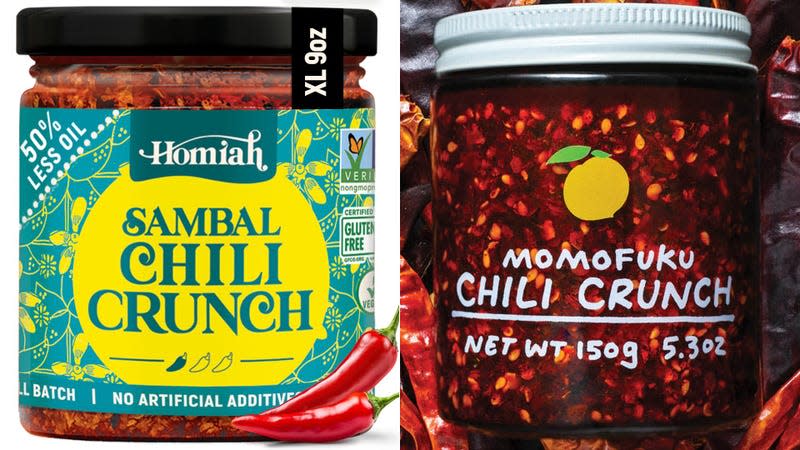David Chang didn't invent chili crunch, so why is Momofuku trying to own it?

- Oops!Something went wrong.Please try again later.
Across the world ketchup is used on burgers, as a dipping sauce, and comes in variations like banana, carrot, or even mayoketchup. However, no one person has deemed that all uses of the term ketchup are solely theirs. Unfortunately, in the case of chili crunch, the Guardian reports celebrity chef David Chang is making the legal argument that his brand Momofuku alone has the right to call its product by that name.
Chang, who owns the food company Momofuku, is attempting to trademark the terms “Chili Crunch” and “Chile Crunch” with the U.S. Patent and Trademark Office (USPTO). In the process, the company has sent cease and desist letters to other brands who use the terms, with either spelling, on their product labels.
Momofuku has already acquired the trademark rights to the term “chile crunch” but is still in the process with the USPTO to acquire the rights to the alternate spelling, “chili.” To achieve this, the company will have to demonstrate the uniqueness of its product and that the term isn’t just a description of what’s inside the jar. Intimidating other brands into not using the phrase could potentially help Momofuku make its argument stronger.
If you’re scratching your head at “chili crunch,” the condiment has essentially the same base ingredients as chili crisp, but the two items have textural differences. The creation of chili crunch comes from chili crisp originally, and Momofuku specifically notes on its website that its chili crunch was “inspired by Chinese chili crisp and crunchy Mexican salsa.” Variations on this product include chili sauce, chili oil, and others, and can be found across the world, though it most commonly appears in Asian cuisines.

As the Guardian reports, companies like Homiah — a Malaysian food brand based in New York — have been sent cease and desist letters from Momofuku. Homiah sells a jarred chili crunch that its founder says was inspired by a family recipe. Despite the origin of this product, Momofuku feels consumers might confuse the two and that Homiah is infringing upon its trademark. (It’s worth noting Homiah’s chili crunch jars are decorated with bright, floral patterns whereas Momofoku uses a simple font and its signature peach logo.)
There are many issues at play in this situation, but two arguments can be made in opposition to his brand’s demand that others not use these terms. While I’m all for giving credit where it’s due, Chang did not effectively invent chili crisp or chili crunch. Perhaps Momofuku was one of the first companies to use the term to describe this condiment and help popularize it in the U.S., but the food itself has been around for quite some time.
These other brands have created products based on recipes that are different from Chang’s. Barring them from calling their products chili crunch would be like me making and selling my grandmother’s tamales but telling every other Mexican person in existence that they can’t sell their family’s version unless they call them masa cakes or something other than tamales. It’s just ridiculous and counterintuitive to sharing this delicious condiment with the world.
People have also become familiar enough with the condiment that even fast food chains likePanda Express have jumped on the bandwagon, which released a limited time Chili Crisp Shrimp entree just last year. What further shows the proliferation of chili crisp and crunch varieties is the fact that Taco Bellbriefly tested out Chile Crisp Chicken at one location in California. Taco Bell’s experiment shows that people generally identify chili crisp or crunch as its own condiment that can come in varying recipes and the ingredient has stretched beyond Asian cuisine in the U.S. What people don’t identify chili crunch or crisp items as is being strictly David Chang’s creation.

